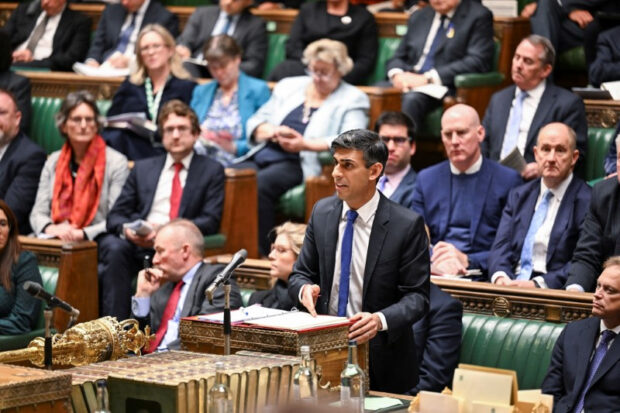
Britain’s Prime Minister Rishi Sunak delivers a ministerial statement titled “Defending the UK and our allies in a more dangerous world” in the House of Commons, in London, Britain January 15, 2024. UK Parliament/Jessica Taylor/Handout via REUTERS/File Photo
LONDON — British Prime Minister Rishi Sunak faces a major parliamentary showdown on Wednesday over his plan to send asylum seekers to Rwanda, with many of his own lawmakers threatening to rebel after they lost an initial bid to toughen his proposed law.
The government comfortably defeated attempts to strengthen the bill late on Tuesday that had been backed by almost a fifth of lawmakers from Sunak’s Conservative Party in what was the biggest rebellion yet against the British prime minister.
But he only won because most opposition parties voted against the rebels, whose action to try to toughen the legislation and close what they say are loopholes, has again exposed deep divisions in the governing party.
The Conservative rebels will now have to decide whether to back down, or join forces with opposition parties to try to defeat the government at the law’s final stage in the House of Commons, known as a third reading.
In an election year when the governing party is badly trailing the opposition Labour Party in the polls, some of those lawmakers who voted for the changes to the legislation might ultimately vote in favor to avoid being criticized by voters.
READ: Britain announces stricter visa measures to reduce net migration
The government confidently predicted it would win the vote, despite one senior rebel lawmaker saying the scale of Tuesday’s rebellion had given the group confidence it could defeat the government.
“We will get it through, but I’m going to listen respectfully to my colleagues this afternoon,” said Michael Tomlinson, illegal immigration minister, adding that Sunak had promised to recruit more judges to process any appeals.
Tomlinson said he expected the government would offer “further confirmation that it will be for ministers to decide” on sending migrants to Rwanda rather than the courts in another attempt to quell the rebellion.
Victory at a cost
But any government victory will come at a cost – Sunak has lost two Conservative vice-chairman over his refusal to compromise with the rebels and his party remains deeply divided.
Simon Clarke, a former Conservative minister, said he was prepared to vote against the government, because the patience of the public with illegal migration would soon be “exhausted” and he did not believe the legislation as drafted would work.
Defeat would be a huge embarrassment for Sunak and would severely weaken his authority over his party, possibly leading to the party’s third leadership election in less than two years.
Sunak has made stopping arrivals of asylum seekers crossing over from France on small boats a central aim of his government.
Most of them say they are fleeing wars and abuse in the Middle East, Africa and South Asia and the majority of arrivals in the last five years whose cases have been completed have been given refugee status.
But the British government says about 90% making the journey are men and many are economic migrants rather than genuine refugees, with their arrivals stretching already struggling public services.
The fight over the legislation has deepened a divide between moderate Conservatives, who are worried about Britain breaching its human rights obligations, and right-wingers, who contend the proposed law does not go far enough.
So far no asylum seekers have been sent to Rwanda because of legal challenges.